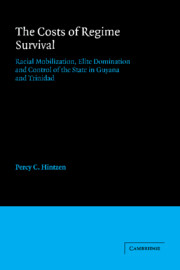 The Costs of Regime Survival
The Costs of Regime Survival Book contents
- Frontmatter
- Contents
- Acknowledgements
- 1 Regime survival and control of the post-colonial state
- 2 Mobilization for control of the state in Guyana and Trinidad
- 3 Maintaining control of the state: strategies for regime survival in Guyana and Trinidad
- 4 Elite support and control of the state: race, ideology,and clientelism
- 5 Regime survival and state control of the economy
- 6 The political and economic costs of regime survival
- 7 Collective needs versus the demands of powerful actors in less developed countries
- Appendix
- Bibliography
- Index
- Other books in the series
5 - Regime survival and state control of the economy
Published online by Cambridge University Press: 08 October 2009
- Frontmatter
- Contents
- Acknowledgements
- 1 Regime survival and control of the post-colonial state
- 2 Mobilization for control of the state in Guyana and Trinidad
- 3 Maintaining control of the state: strategies for regime survival in Guyana and Trinidad
- 4 Elite support and control of the state: race, ideology,and clientelism
- 5 Regime survival and state control of the economy
- 6 The political and economic costs of regime survival
- 7 Collective needs versus the demands of powerful actors in less developed countries
- Appendix
- Bibliography
- Index
- Other books in the series
Summary
Control of the economy implies an ability and a capacity for authoritative decision-making in all areas of economic activity. Regime survival in post-colonial states such as Guyana and Trinidad is invariably hinged to an ability to secure the compliance to state decision-making of the powerful private sector, and particularly its international segment. It is also tied to the ability to neutralize politically powerful economic actors in the face of opposition to new nationalist definitions of state interests and to a new nationalist economic agenda. As was pointed out in Chapter 1, these normally produce a fracturing of the old relationships between the colonial state and the privileged private economic sector whose interests were typically protected and furthered by the former. It was demonstrated in the previous chapter how control of the economy through a program of nationalization can act to demobilize effectively the private sector and neutralize its political influence. As was also shown to be the case, state control of the economy can make available to the regime a significantly larger share of the country's economic resources to be employed in ways that enhance regime survival.
A regime is forced to weigh its decision to gain control over the economy against the potential consequences of its efforts to do so. Powerful actors might resist such efforts and might employ their resources to challenge the regime, to conduct or support a campaign of political and/or economic destabilization (which might involve the use of international resources), and even to secure the outright overthrow of the political leadership.
- Type
- Chapter
- Information
- The Costs of Regime SurvivalRacial Mobilization, Elite Domination and Control of the State in Guyana and Trinidad, pp. 126 - 164Publisher: Cambridge University PressPrint publication year: 1989


